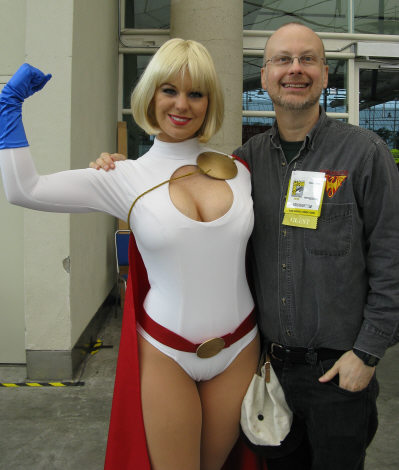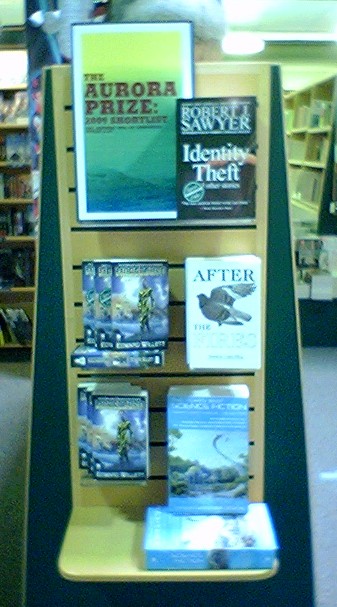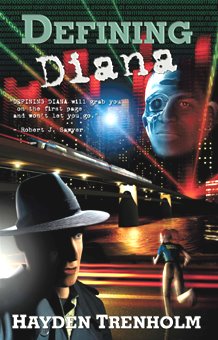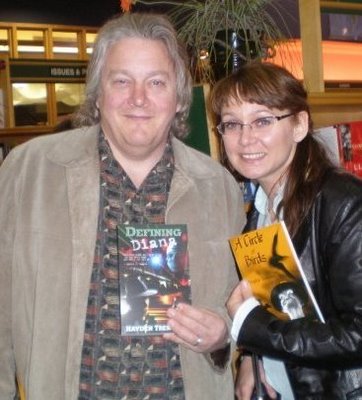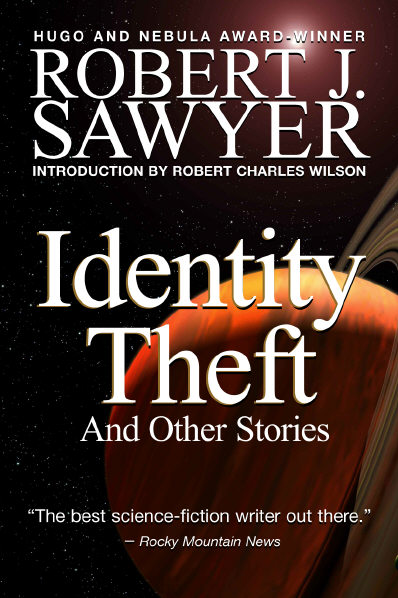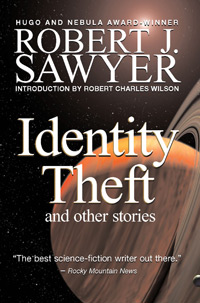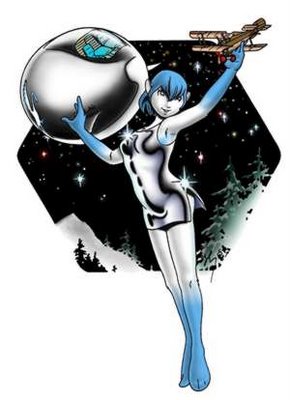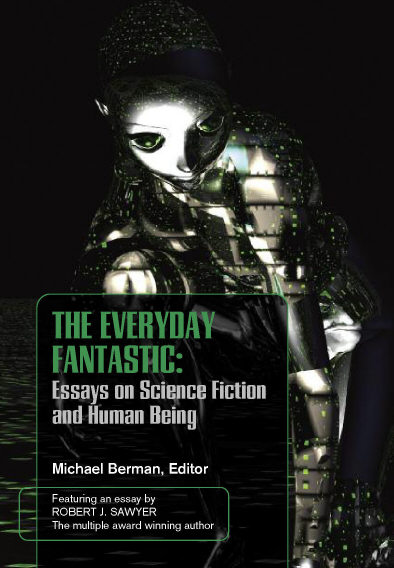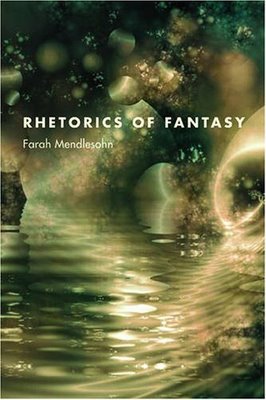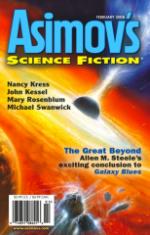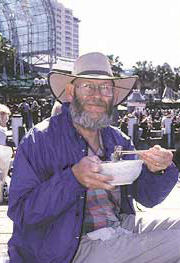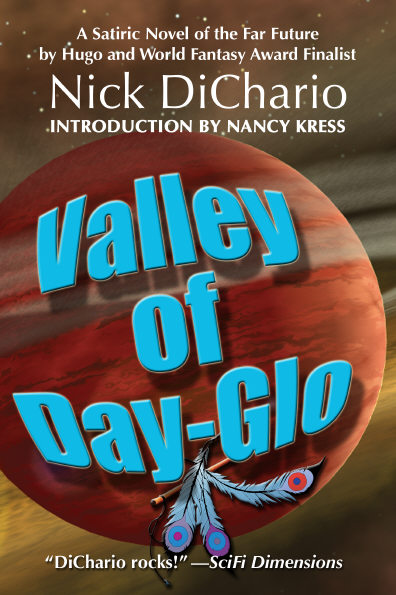
On Thursday, August 26, 2004, I was called upon to welcome visiting Australian SF writer
K.A. Bedford on behalf of the Canadian SF scene at his reading and signing at the World's Biggest Bookstore in Toronto, and we've been friends ever since. Although he lives Down Under, he's published here in Canada (he was "discovered" by the wonderful
Robyn M. Herrington of Calgary, to whom my novel
Rollback is dedicated).
The latest book by Adrian (as he's known) is
Time Machines Repaired While-U-Wait, and it has just been nominated for not one but two major awards: Australia's Aurealis and the United States's Philip K. Dick (an award for which I myself was a juror in 1995). Here's the press release from his publisher -- way to go, Adrian!
Time Machines isn't eligible for the Aurora -- it's the nationality of the author, not the publisher, that counts -- but it most certainly is eligible for the Hugo ...
DOUBLE TROUBLE:Canadian Book by Australian Author
Shortlisted for Two Top Book Awards
[Calgary, AB, January 13, 2009]
EDGE Science Fiction and Fantasy Publishing is proud to announce that
Time Machines Repaired While-U-Wait, by Australian author
K.A. Bedford, has been shortlisted for both the
Aurealis (Australia's premier award for science fiction literature) and the
Philip K. Dick (for distinguished original science fiction) AWARDS.
The Aurealis Awards are in their fourteenth year as Australia's premier awards for speculative fiction.
The Philip K. Dick Award is presented annually with the support of the Philip K. Dick Trust for distinguished science fiction.
EDGE publisher Brian Hades stated in an interview today, "We are extremely proud of Adrian. This is his fourth novel, and he is proving to be the new voice in science fiction we've all been waiting for."
Author Bedford comment on his back-to-back listings by simply stating, "I'm gobsmacked!"
Bedford recently completed a North American promotional book tour for
Time Machines Repaired While-U-Wait stopping in Denver, Colorado, to attended the World Science Fiction Convention and Calgary, Alberta, where he was the author Guest of Honour.
About the Novel:Time Machines Repaired While-U-Wait: In the future, Aloysius "Spider" Webb will journey to the End of Time. For now, Spider must be content with repairing broken time machines, rebuilding his life and avoiding the lunatic antics of his boss, Dickhead McMahon.
Spider's life is status quo until he discovers, inside a broken second-hand time machine, the corpse of a brutally murdered woman from the future. The Department of Time and Space steps in to manage the situation leaving Spider asking a lot of questions that only lead to more questions; unsettling evidence, brewing trouble, and the knowledge that Spider himself might be involved in an epic battle for control of time itself.
Will his knowing the future be a curse or a blessing? Will Spider Webb find out how things turn out before they happen? And, with his new found knowledge, who will Spider trust?
It will all happen before the End of Time!
About the Author:K.A. Bedford was born in Fremantle, Australia in 1963. He attended Murdoch University, in Perth and studied Writing, Theatre, and Philosophy, before becoming actively involved in the Australian SF community.
Time Machines Repaired While-U-Wait is his fourth novel. He lives with his wife, Michelle, near Perth, Australia.
Presentation of the Awards:The Aurealis Award will be presented at the Judith Wright Centre of Contemporary Arts in Brisbane, Australia on Saturday 24 January 2009.
The Philip K. Dick Award will be presented on Friday, April 10, 2009 at Norwescon 32 at the Doubletree Seattle Airport Hotel, SeaTac, Washington.
About the Aurealis Awards:The Aurealis Awards were established in 1995 by Chimaera Publications, the publishers of Aurealis Magazine, to recognize the achievements of Australian science fiction, fantasy and horror writers.
The Aurealis Awards have a significant history behind them now. Since the Awards' first ceremony, both the field of literature and the vibrancy of the Australian speculative fiction community have grown substantially. The extensive list of past winners and finalists is not only a great guide to a basic bookshelf selection of the best Australian works; it is also a useful survey of more than a decade's worth of significant topics and themes, a who's who of the genre locally and the growth of the Australian publishing industry's commitment to the genre. Winners will be announced at the Aurealis Awards ceremony at the Judith Wright Centre of Contemporary Arts in Brisbane on Saturday 24 January 2009.
For more information on the Aurealis Awards, please visit their website:
http://www.aurealisawards.com/About the Philip K. Dick Award:The Philip K. Dick Award is presented annually with the support of the Philip K. Dick Trust for distinguished science fiction published in paperback original form in the United States. The award is sponsored by the Philadelphia Science Fiction Society and the Philip K. Dick Trust and the award ceremony is sponsored by the NorthWest Science Fiction Society.
More Information on the Book:For further information on Time Machines Repaired While-U-Wait please visit our
webpage.
The Robert J. Sawyer Web Site
Labels: Awards 2009
